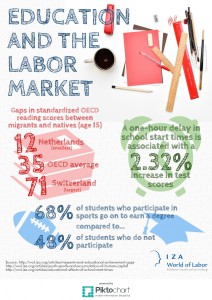 Boys perform worse in school than girls, which has been dubbed the “Boy Crisis”. An analysis of the latest data on educational outcomes among boys and girls reveals extensive disparities in grades, reading and writing test scores, and other measurable educational outcomes, and these disparities exist across family resources and race.
Boys perform worse in school than girls, which has been dubbed the “Boy Crisis”. An analysis of the latest data on educational outcomes among boys and girls reveals extensive disparities in grades, reading and writing test scores, and other measurable educational outcomes, and these disparities exist across family resources and race.
Focusing on disadvantaged schoolchildren, a new IZA paper by Robert Fairlie (University of California, Santa Cruz) examines whether time investments made by boys and girls related to computer use contribute to the gender gap in academic achievement. Data from several sources indicate that boys are less likely to use computers for schoolwork. Boys are more likely to use computers for playing games, but less likely than girls to use computers for social networking and e-mail.
Using data from a large field experiment randomly providing free personal computers to schoolchildren for home use, the study also tests whether these differential patterns of computer use displace homework time and ultimately translate into worse educational outcomes among boys. No evidence is found indicating that personal computers crowd out homework time and effort for disadvantaged boys relative to girls. Home computers also do not have negative effects on educational outcomes such as grades, test scores, courses completed, and tardies for disadvantaged boys relative to girls.
See also the recent IZA World of Labor “Spotlight on Education”:
